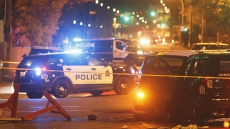On a recent crisp fall morning, a compact white shuttle bus rolled to a stop just off the Yellowhead Highway. Four people hastily exited and began to walk briskly toward their destinations.
After all, it was 9:38 a.m., giving them just over five hours in Smithers before the bus departed again at 3 p.m.
One of the passengers was Joe Scheck, 50, who catches the bus from Houston three times a week to do yard work in Smithers. His boss would like him to work full time, but the bus only runs on Monday, Wednesday and Friday.
"If I could, I would do it five times a week," said Scheck, standing next to his rusty Jeep bicycle, his only other form of transportation.
Scheck, like many residents of small communities along Highway 16 in central British Columbia, can't afford to live in Smithers but also can't find work — or even buy groceries — in his town. If he were able to work five days a week, he estimates he'd take home an extra $400 a month.
The province launched the $5-a-trip bus route from Burns Lake to Smithers in June. It also started a route from Prince George to Burns Lake, which operates Tuesdays, Thursdays and Saturdays. A route that connects Smithers and nearby Moricetown has operated since January.
Still, advocates say the service is only a patchwork, and it arrived more than a decade after families and Indigenous advocates called on the government to provide public transportation along a notorious stretch of Highway 16 known as the Highway of Tears.
The RCMP says 18 women have gone missing or have been murdered on the route between Prince Rupert and Prince George, but advocates argue the real number is more than 40. Many of the women disappeared while hitchhiking in remote areas with poor or no cell service.
At hearings held by the national inquiry into missing and murdered Indigenous women in Smithers last week, the lack of adequate transportation in the region came up repeatedly.
Gladys Radek, whose 22-year-old niece Tamara Lynn Chipman disappeared while hitchhiking in Prince Rupert in 2005, told the inquiry she knows people who have to hitchhike just to go to work. There should be a free shuttle bus service, she said.
"I've even picked up a young lady, just outside of Smithers, to take her back to Moricetown because she had to go see a doctor. She was nine months pregnant," she said.
The community is also reeling from the news that Greyhound Canada has applied to provincial regulators to cancel its route from Prince George to Prince Rupert, said Radek.
Greyhound said the deaths and disappearances of women in the area are tragic but that the new publicly subsidized routes have "literally put us out of business" in this corridor.
VIA Rail also operates a train along the route. Last August, it was widely reported the company was in talks with the B.C. government to offer $5 fares to "vulnerable" riders, but the idea has yet to materialize. VIA Rail said it is still discussing the matter.
The call for a shuttle bus that visits every reserve and route along the route dates back to 2006, when First Nations leaders, families and advocacy groups held a Highway of Tears Symposium that produced 33 recommendations.
In 2012, Wally Oppal completed his final report after leading a provincial inquiry into missing and murdered women. The former B.C. attorney general urged the province to immediately commit to his recommendation that it implement public transit along the highway.
But it wasn't until 2015 that the former Liberal government announced a $3-million plan for transportation along the Highway of Tears, including transit expansion, First Nations driver training and a community vehicle grant program.
Liberal spokesman Shane Mills said the safety of women along Highway 16 was a priority for the government.
"Improving transportation was done in consultation with First Nations and local governments," he said in an email.
The NDP regularly criticized the government on the issue while in Opposition, but did not commit any new funds to public transit on Highway 16 in its recent fiscal update. Transportation Minister Claire Trevena couldn't be reached for comment.
Oppal declined to offer an opinion on the province's response to his recommendation, but he said it's clear there must be satisfactory transportation on the route that discourages hitchhiking.
"We owe it to the women," he said.




